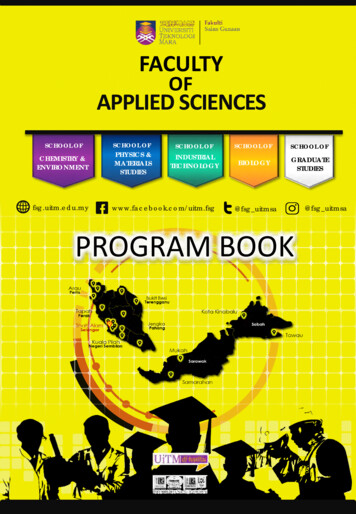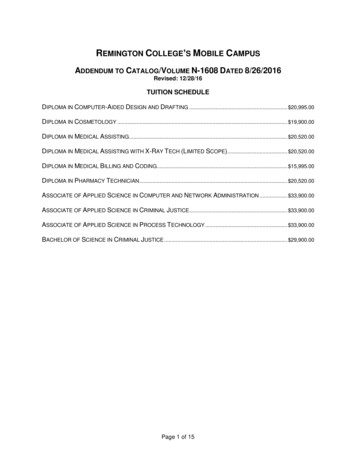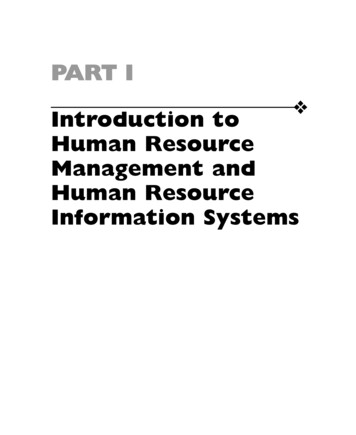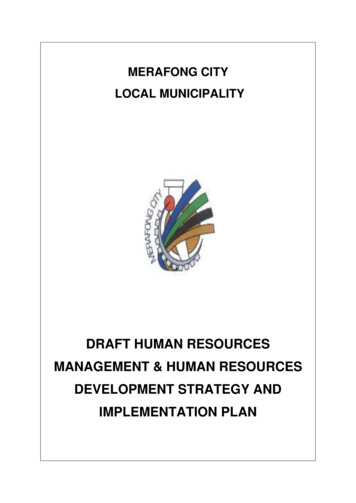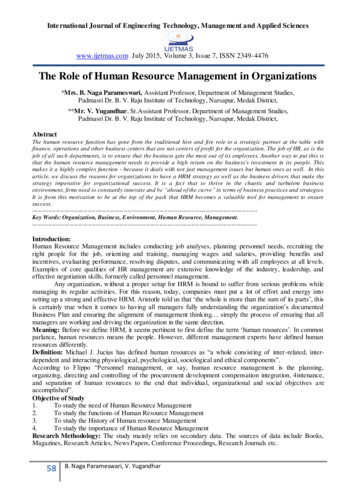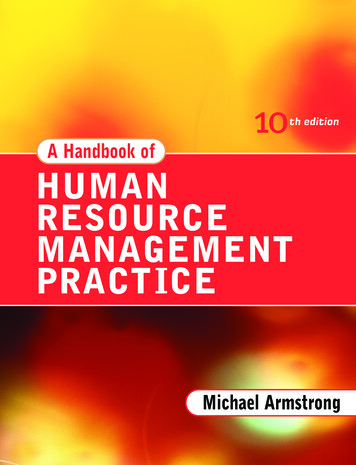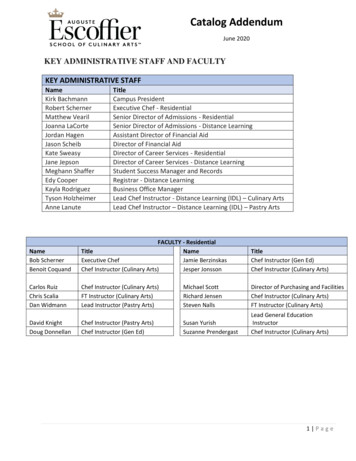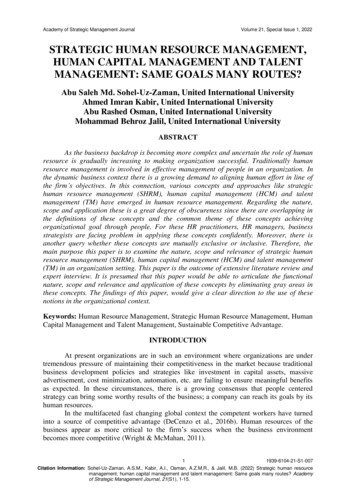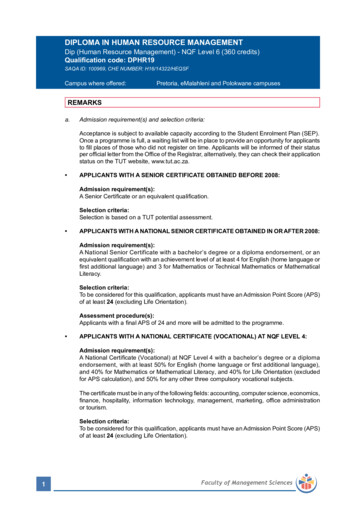
Transcription
DIPLOMA IN HUMAN RESOURCE MANAGEMENTDip (Human Resource Management) - NQF Level 6 (360 credits)Qualification code: DPHR19SAQA ID: 100969, CHE NUMBER: H16/14322/HEQSFCampus where offered:Pretoria, eMalahleni and Polokwane campusesREMARKSa.Admission requirement(s) and selection criteria:Acceptance is subject to available capacity according to the Student Enrolment Plan (SEP).Once a programme is full, a waiting list will be in place to provide an opportunity for applicantsto fill places of those who did not register on time. Applicants will be informed of their statusper official letter from the Office of the Registrar, alternatively, they can check their applicationstatus on the TUT website, www.tut.ac.za. APPLICANTS WITH A SENIOR CERTIFICATE OBTAINED BEFORE 2008:Admission requirement(s):A Senior Certificate or an equivalent qualification.Selection criteria:Selection is based on a TUT potential assessment. APPLICANTS WITH A NATIONAL SENIOR CERTIFICATE OBTAINED IN OR AFTER 2008:Admission requirement(s):A National Senior Certificate with a bachelor’s degree or a diploma endorsement, or anequivalent qualification with an achievement level of at least 4 for English (home language orfirst additional language) and 3 for Mathematics or Technical Mathematics or MathematicalLiteracy.Selection criteria:To be considered for this qualification, applicants must have an Admission Point Score (APS)of at least 24 (excluding Life Orientation).Assessment procedure(s):Applicants with a final APS of 24 and more will be admitted to the programme. APPLICANTS WITH A NATIONAL CERTIFICATE (VOCATIONAL) AT NQF LEVEL 4:Admission requirement(s):A National Certificate (Vocational) at NQF Level 4 with a bachelor’s degree or a diplomaendorsement, with at least 50% for English (home language or first additional language),and 40% for Mathematics or Mathematical Literacy, and 40% for Life Orientation (excludedfor APS calculation), and 50% for any other three compulsory vocational subjects.The certificate must be in any of the following fields: accounting, computer science, economics,finance, hospitality, information technology, management, marketing, office administrationor tourism.Selection criteria:To be considered for this qualification, applicants must have an Admission Point Score (APS)of at least 24 (excluding Life Orientation).1Faculty of Management Sciences
Assessment procedure(s):Applicants with a final APS of 24 and more will be admitted to the programme. APPLICANTS WITH A NATIONAL N DIPLOMA (NQF LEVEL 6):Admission requirement(s):Applicants with a National N Diploma (Nated 191: N6 in study field of HRM) issued by theCouncil for Quality Assurance in General and Further Education and Training (Umalusi), whoobtained at least a 50% pass mark at TVET Level N6 for all modules in the HRM field of study(Labour Relations N6, Computer Practice N6, Personnel Management N6 and PersonnelTraining N6) will be exempted from the first-year modules and will start with second-yearmodules for the Diploma.b.Recognition of Prior Learning (RPL), equivalence and status:See Chapter 30 of Students' Rules and Regulations.c.Intake for the qualification:January only.d.Presentation:Day classes.e.Minimum duration:Three years.f.Exclusion and readmission:See Chapter 2 of Students' Rules and Regulations.g.WIL in Human Resources Management:See Chapter 5 of Students’ Rules and Regulations.CURRICULUMFIRST tical Accounting IBusiness Management ICommunication for AcademicPurposesComputer LiteracyHuman Resource Management IInformation Literacy I(block module)Life Skills I (block module)Quantitative OTAL CREDITS FOR THE FIRST YEAR:PREREQUISITE MODULE(S)120SECOND YEARCODEMODULENQF-LCREDITPREREQUISITE ss Management IIHuman Resource Development IHuman Resource Management IILabour LawLabour Relations I(6)(5)(6)(6)(5)(24)(24)(24)(24)(24)Business Management ITOTAL CREDITS FOR THE SECOND YEAR:2Human Resource Management I120Faculty of Management Sciences
THIRD YEARCODEMODULENQF-LCREDITPREREQUISITE MODULE(S)BSM306DHRD306DHRM306DHRX306DBusiness Management IIIHuman Resource Development IIHuman Resource Management IIIWIL in Human ResourcesManagementLabour Relations II(6)(6)(6)(6)(24)(24)(24)(24)Business Management IIHuman Resource Development IHuman Resource Management II(6)(24)Labour Relations ILRA306DTOTAL CREDITS FOR THE THIRD YEAR:120TOTAL CREDITS FOR THE QUALIFICATION:360MODULE INFORMATION (OVERVIEW OF SYLLABUS)The syllabus content is subject to change to accommodate industry changes. Please note that a more detailedsyllabus is available at the Department or in the study guide that is applicable to a particular module. At timeof publication, the syllabus content was defined as follows:BBUSINESS MANAGEMENT I (BSM105D)1 X 3-HOUR PAPER(Module custodian: Department of Management and Entrepreneurship)A focus on the different management functions of business organisations in the South African environment. Itdescribes how managers should manage resources and activities in such a way that organisations can operateas profitably as possible. (Total notional time: 240 hours)BUSINESS MANAGEMENT II (BSM206D)1 X 3-HOUR PAPER(Module custodian: Department of Management and Entrepreneurship)The financial and operations functions are dealt with comprehensively. Financial Management offers studentsinsight into finance theory and practice with emphasis on financial decision making which will increase the valueof the business organisation. Financing decisions of investment, financing and working capital managementare dealt with. Operations management gives an overview of the activities of the operations function in themanufacturing and services sectors. (Total notional time: 240 hours)BUSINESS MANAGEMENT III (BSM306D)1 X 3-HOUR PAPER(Module custodian: Department of Management and Entrepreneurship)Students acquire skills to apply management functions, develop a broad understanding of business andmanagement concepts. It relates to theoretical models that can be applied in a workplace such as changemanagement, strategy and diversity management. The marketing management component provides studentswith advanced knowledge in areas such as applied principles in marketing and research, product development,design of the marketing plan, environmental analysis, creativity and innovation. (Total notional time: 240 hours)CCOMMUNICATION FOR ACADEMIC PURPOSES (CAP105X)1 X 3-HOUR PAPER(Module custodian: Department of Applied Languages)A workable knowledge of English is an essential skill for any graduate who is required to conduct themselvessuccessfully in a professional working environment. This module will equip students with the competenciesrequired to compose a selection of written texts related to communicating both internally and externally within a professional environment. In addition, the module includes strategies that are essential for the effectivecommunication in various situations, including small groups to avoid unproductive conflict, a multiculturalcontext, etc. (Total notional time: 100 hours)3Faculty of Management Sciences
COMPUTER LITERACY (CPL105X)CONTINUOUS ASSESSMENT(Module custodian: End User Computing Unit)Provides foundational knowledge in computing fundamentals, essential digital skills in key applications basedon MS Office Suite and network basics (i.e. MS Outlook and Internet). Online exams are mapped with EndUser Computing: SAQA 49077 (61591) Core Element as well as Internet and Computing Core Certification(IC3). (Total notional time: 100 hours)HUMAN RESOURCE DEVELOPMENT I (HRD205D)1 X 3-HOUR PAPER(Module custodian: Department of People Management and Development)This module focuses on the context of South African legislation, which impacts on training and skills develop- ment to establish effective Human Resource Development (HRD) practices. It intends to define the basiccompetencies of students who need to be orientated about the theory and practice of HRD and adult learningin the workplace, students will acquire specific skills and knowledge in the areas such as concepts of training,learning theories and principles, adult learning (Adult Basic Education and Training), role and functions of HRDpractitioner, training cycle, training legislation, managing the training department and administration of trainingand development in organisations. (Total notional time: 240 hours)HUMAN RESOURCE DEVELOPMENT II (HRD306D)1 X 3-HOUR PAPER(Module custodian: Department of People Management and Development)Understand the Education, Training and Development (ETD) context in South Africa. The skills developmentprocess. Design and develop learning programmes. Explore different learning strategies. Student support inETD. Learning strategies for ETD. Administration of ETD in organisations. Presenting ETD. Team building anddiversity management. (Total notional time: 240 hours)HUMAN RESOURCE MANAGEMENT I (HRM105D)1 X 3-HOUR PAPER(Module custodian: Department of People Management and Development)A broad frame of reference regarding basic psychology and social perception that can be understood in theworkplace, that include themes such as individual differences, human abilities, personality, frustration, conflict,stress, perception, learning, memory, attitudes, social perception, role theory and group dynamics. Studentsare introduced to the role of Human Resource Management that forms the basis for the second-year level ofthis module. (Total notional time: 240 hours)HUMAN RESOURCE MANAGEMENT II (HRM206D)1 X 3-HOUR PAPER(Module custodian: Department of People Management and Development)The purpose of this module is to equip students with the applied competence to operate within a HumanResources Management environment. students will acquire specific skills and knowledge in the following areas:Job design and job analysis; Recruitment and selection; Employee on-boarding, motivation and retention,Career management; Performance management and appraisal and managing compensation and benefits.(Total notional time: 240 hours)HUMAN RESOURCE MANAGEMENT III (HRM306D)1 X 3-HOUR PAPER(Module custodian: Department of People Management and Development)The dynamic factors in Human Resources Management require assessment outcomes on organisationalbehaviour, organisational culture and socialisation, mentorship, globalisation as an economic and businessactivity, performance management, motivation in an organisation, group and team behaviour, stress in the workplace, structure and design of organisations, fundamentals of leadership, communication processes, decisionmaking, competency-based frameworks, diversity, technology in the HR environment, managing organisationalchange and learning and ethics in the workplace. (Total notional time: 240 hours)IINFORMATION LITERACY I (INI125D)CONTINUOUS ASSESSMENT(Module custodian: Directorate of Library and Information Services)Introduction of information literacy. Development of a search strategy and application of a search string to searchengines and academic databases. Evaluation of information sources. Ethical and legal use of information. (Totalnotional time: 20 hours)4Faculty of Management Sciences
LLABOUR LAW (LLW206D)1 X 3-HOUR PAPER(Module custodian: Department of Law)Introduction to Law. Common Law. Basic Conditions of Employment Act, 1997 (Act No. 75 of 1997), theEmployment Equity Act, 1998 (Act No. 55 of 1998), Unemployment Insurance Act, 2001 (Act No. 63 of 2001),Compensation for Occupational Injuries and Diseases Act, 1993 (Act No. 13 of 1993), Occupational Healthand Safety Act, 1993 (Act No. 85 of 1993); and the Skills Development Act, 1998 (Act No. 97 of 1998). Adetailed discussion on the Labour Relations which includes freedom of association, organisational rights,collective bargaining overview of dispute resolution, dismissals and strikes. (Total notional time: 240 hours)LABOUR RELATIONS I (LRA205D)1 X 3-HOUR PAPER(Module custodian: Department of People Management and Development)An introduction to the South African labour relations foundations, the labour relations environment, the state andlabour laws, labour relations management systems, workplace level labour relations, collective labour relations,dispute resolution and industrial action. Students are introduced to labour relations management and the role oflabour relations systems that form the basis for the second-year subject in the study field. (Total notional time:240 hours)LABOUR RELATIONS II (LRA306D)1 X 3-HOUR PAPER(Module custodian: Department of People Management and Development)To describe the theoretical contexts from which behaviour in labour relationships are studied and explain thecomponents of a complex labour relations system, the composition and challenges in the South African labourmarket, apply labour legislation and labour relations management practices regarding retrenchment and termination of employment, strategies of trade unions, employer organisation, collective bargaining and organisational rights, as well as negotiations and dispute resolution and the nature of industrial action. (Total notionaltime: 240 hours)LIFE SKILLS I (LFI125X)CONTINUOUS ASSESSMENT(Module custodian: Directorate of Student Development and Support)Personal, socio-emotional and academic skills development for students in higher education. This moduleincludes 1. Intra- and interpersonal skills (e.g. emotional intelligence, relationships, and conflict management);2. General study skills (e.g. time management, goal setting, learning styles); 3. Health and wellness (e.g. HIV/AIDS, GBV issues, substance abuse); 4. Student life and adjustment (e.g. identity development, adjusting to ahigher education environment); and 5. Financial management. (Total notional time: 20 hours)PPRACTICAL ACCOUNTING I (ACP105D)1 X 3-HOUR PAPER(Module custodian: Department of Accounting)Introduction to accounting, the accounting equation, books of prime entry, bank reconciliation statements,debtors and creditors control accounts. Adjustments, financial statements (sole trader), inventory (differentsystems and valuation), budgets and budgetary control, non-current assets and their disclosure, manufacturingaccounts, cost-volume-profit analysis, different forms of enterprise, their financial statements and relatedmatters, basic cost accounting and cost behaviour. (Total notional time: 240 hours)QQUANTITATIVE TECHNIQUES (QTS105D)1 X 3-HOUR PAPER(Module custodian: Department of Mathematics and Statistics)Introduction to statistics and sampling methods, organisation and description of data using tables and graphs,measures of location and dispersion, basic probability, probability distributions (binomial, poisson, normal),Introduction to sampling distributions (means and proportions), confidence intervals, hypothesis testing, Chisquared tests, regression and correlation analysis, time series analysis, index numbers, elementary interestcalculations. (Total notional time: 240 hours)5Faculty of Management Sciences
WWIL IN HUMAN RESOURCES MANAGEMENT (HRX306D)WORK-INTEGRATED LEARNING(Module custodian: Department of People Management and Development)The purpose of this module is to equip students with the applied competence to operate within a managerialcontext in an organisation. students will typically acquire specific skills and knowledge in the areas such ascollaborative and teamwork, communication, critical thinking and problem-solving, initiatives and self-management, uses appropriate technology to accomplish tasks, applies technology skills to problem solving, creativityand innovation, information management, workplace context and culture and technical and work skills. (Totalnotional time: 240 hours)6Faculty of Management Sciences
DIPLOMA IN HUMAN RESOURCE MANAGEMENT Dip (Human Resource Management) - NQF Level 6 (360 credits) . and selection criteria: Acceptance is subject to available capacity according to the Student Enrolment Plan (SEP). Once a programme is full, a waiting list will be in place to provide an opportunity for applicants . Recruitment and selection .
